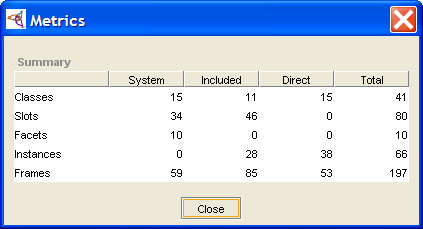Difference between revisions of "PrF UG projects project metrics"
| Line 10: | Line 10: | ||
=== Viewing Project Metrics === | === Viewing Project Metrics === | ||
| − | To view project metrics | + | To view project metrics, select <b>Project | Metrics</b>: |
| − | |||
| − | |||
| − | |||
| − | |||
| − | |||
| − | |||
<div>[[Image:PrF_UG_projects_metrics.png|projects_metrics]]</div> | <div>[[Image:PrF_UG_projects_metrics.png|projects_metrics]]</div> | ||
Revision as of 11:31, October 16, 2008
Project Metrics
Project metrics provide information about the number of frames in the current project. This information can be useful in analyzing performance issues.
Viewing Project Metrics
To view project metrics, select Project | Metrics:
Scalability and Tuning
Protege-Frames has successfully handled "simulated" knowledge bases (generated by a program) as large as 5M frames (classes & instances). Actual knowledge bases as large as 100K frames give acceptable UI performance if supported by the database backend.
For file-based projects, the primary impact of increasing the number of frames is that the project takes longer to load (load time is roughly proportional to the number of frames). For database projects, slow operations include expanding a class with a lot of direct subclasses and displaying the instances for a class with many instances.
Aside from limiting the size of the knowledge base, the most important thing to tune is the heap size. For more information, see Scalability and Tuning in Protege.
